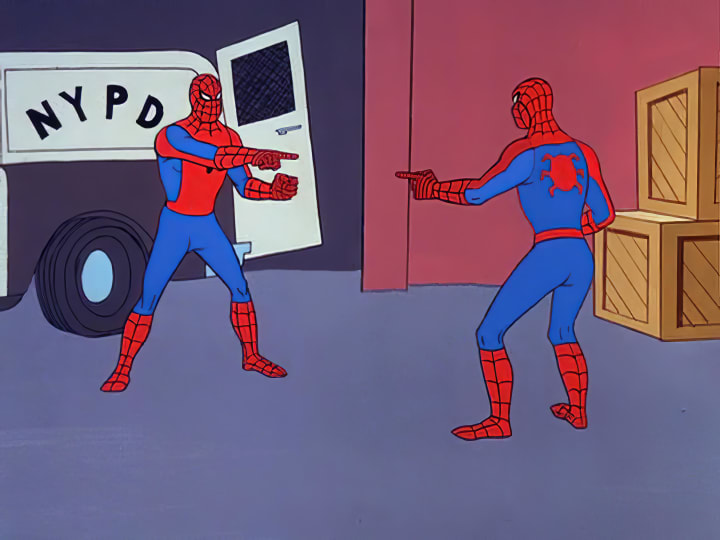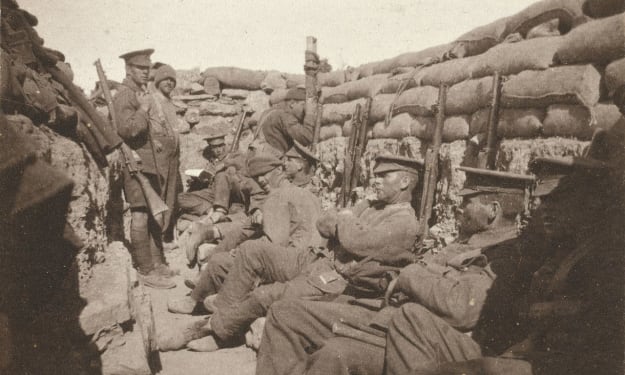Looking Back on "Looking Back: Advice to My Younger Self (and Any Other Beginner Writers)"
Reflecting on the reflected

I Can Explain
You might be thinking, "Stephen, what the f*ck is that title?" And I certainly wouldn't hold it against you, Lamar. It is a bit of a heady statement.
For context, I published a post in 2021 on a platform that I have neither weak nor strong feelings about. Instead, you might just say I have *checks that Vocal isn't watching* medium feelings about it. That post is titled "Looking Back: Advice to My Younger Self (and Any Other Beginner Writers)." I could link to it, but why? Stay here, goddamn it.
So, given how many other Vocal creators I've noticed integrating efforts between Vocal and *sees Vocal looking my way* the, uh, inferior writing platform, I started to think how I might put that into action.
But rather than simply reposting my pieces from Vocal to the *cough* other place, I thought I'd instead bring in an old piece of writing from that platform and update it with all I've learned in the 2.5 years since its creation.
Only to read "Looking Back..." and discover it's still just as relevant today as it was back then. What a let down 😢
Still, in the interest of sharing my wisdom far and wide, I shall bring it here from Med— *sees Vocal glaring daggers* —I mean, "the other one" and provide additional commentary. So, still value added versus simply reposting here.
Without further ado:
Looking Back: Advice to My Younger Self (and Any Other Beginner Writers)
2021 Author’s Note: Many of the below sections could have their own entire post dedicated to the details, but I’m not sure a just-starting writer would really want to keep track of all that.
After all, as I cover in Point 1, I don’t want them to spend too much time thinking as opposed to drafting — and throwing minutiae at them around the finer points of editing and submitting would directly counteract that goal. I am also, at heart, a prose writer, so while many of these points can apply across the spectrum, I will most definitely be biased toward advice to help fellow fiction writers. You’ve been warned.
2024 Author's Note: What he said^
Writing is key
This sounds stupidly obvious, I know. But it seems like a lot of folks out there spend too much time talking about writing when they’re first starting out than doing it.
There’s nothing wrong with planning, but if you’ve spent months strategizing without picking up a pen (or pulling out the keyboard), then you may be in for a rude awakening when you find that you don’t like writing. Imagine spending all that time for no return.
I’d always rather jump in too quickly and do more editing later than spend so much time thinking that I never start.
2024 Author's Note: A point so glaringly obvious I feel no need to add on. But I like the metaphor prior Stephen built by including this subject (see below).
Which brings us to the next point:
Editing is unavoidable
In the early days, I fell into the classic trap of calling a draft done the second I’d written the last word and start sharing it out. Now, I know that’s the absolute worst next step. No one should see your first draft except you.
Even in pieces that I feel confident in, I’m proofreading before sharing at the very least. More often, I’m inspecting the flow of the story and deciding which sections need expansion, subtraction, or even new direction. After that, I’m proofreading.
2024 Author's Note: This will remain forever and always my gospel. Edit, edit, edit. Of course, it doesn't help that other authors come to me to be "that guy" for their books, too :) Gotta keep the critical eye sharp for that paper *rubs dollar bills together*
If drafting is the core of writing, editing is the next layer of our metaphorical writing planet. Which moves us toward the crust:
Reading is also crucial
You’ll notice that many of these snippets of wisdom flow into each other. I would dare say that no writer out there ever started drafting without reading first.
It seems that many origin stories go along the lines of “I really loved books as a kid, and one day I thought ‘Why don’t I write my own?’”
Reading not only serves as that first spark for many of us, but it also helps us appreciate how good writing looks in practice (plot, language, characters, formatting, pacing, etc.). On top of all of that great stuff...
2024 Author's Note: Damn you, prior Stephen and your seamless transitions. Makes it impossible to insert commentary without resorting to the cursed ellipses and breaking your effortless flow.
All I will add here is that reading is also a great way to relax and still feel like you're supporting your writing goals even while not drafting. It's appreciating the final product of writing and helping you form opinions on what does or doesn't work.
Something else I appreciate more now than back in 2021 is how even fun activities like writing can lose their luster if you start treating them too much like work/chores. Goals are good, but writing for writing's sake is also equally valid. There does not need to always be a strategic vision behind it.
Sometimes you can write something because the idea sounded fun. Sometimes you can read because the book sounded fun.
...it can also serve as inspiration:
Write what you want to read
The first piece of serious writing I ever did was my attempt to write Book Nine of the Guardians of Ga’Hoole series by Kathryn Lasky. Back in Fourth (or maybe Fifth?) Grade, I was a huge fan of these books and therefore was horrified to think that perhaps I’d read the last one ever.
“If she won’t write anymore, then I guess it’s up to me” I reasoned. Fortunately, Lasky did keep going for another seven books, because, despite the best attempts at typing with two forefingers, I never finished my version. In the age before cloud backups, my version was lost to history when my family switched computers—perhaps for the best.
My point is that you should write the sort of stories you’d enjoy instead of worrying about what the market wants. Market trends change, and though a genre may be “hot” at the moment, if it’s not a subject matter that inspires you, that lack of enthusiasm will inevitably come through in your writing. And good luck placing a story that even you don’t like that much. Better to focus on writing quality stories that excite you and worry about the rest of the process later.
2024 Author's Note: Still valid today and always. Write your truth, Mackenzie.
Which brings us to the next point:
Many aspects of what makes “good writing” are subjective
Sooner or later, you’ll feel that you’re ready to start sending your stories out to publications. And unless you’re extremely lucky or skilled (probably both), you’ll then encounter a wall of rejection. Naturally, you’ll ask questions that will all come from a common core: “Does this mean my writing sucks?”
2024 Author's Note: Short answer: no.
It’s important to understand that a lot of reasons for rejection are out of your control, ranging from bad timing to the editors already having filled the slots for a magazine to the editors just not being inspired by your particular story. That said, there are others out there that would be happy to have your writing in a perfect world. There’s nothing to it but to keep trying.
2024 Author's Note: This is just as true now as back then. Moreso even because I have more stories out to more publishers than ever before, and that means rejections galore.
Never assume you're "established" and that means you stand better odds. I've suffered a fairly protracted string of story rejections, both with Vocal Challenges and out in the badlands beyond Vocal's walls. My mantra has evolved to "If I give up, then they win." You wouldn't believe how good of a motivator spite can be.
However, there are reasons for rejection that are completely within your control:
Some aspects of what makes “good writing” are NOT
If you have not taken my editing advice from earlier seriously, please reconsider.
Editors are typically receiving huge numbers of submissions these days when submitting is as easy as filling out a form on Submittable. Being humans like us, they are looking for ways to quickly reject stories to reduce their workload. Most will forgive a couple typos, but if your draft is riddled with spelling errors, grammar errors, and formatting errors, that’s an easy rejection for the editor.
2024 Author's Note: Let prior Stephen cook. This is 🔥 advice
On a related note, I did a deep dive on the rejection emails that have graced my inbox over the years: https://vocal.media/journal/the-acceptance-the-rejection-and-the-f-you-i-go-back-and-catalog-years-of-short-story-submission-responses
I mean, you gotta hand it to me for that URL alone 🔥🔥
Don’t let yourself be an easy rejection.
There are publications out there who want your work — you just have to look
Following on from our last two points, take some time to understand the genre you’re writing in when you start to think about submitting your work. You love to write horror, but there aren’t too many horror magazines out there, so send the story to a literary magazine. They’ll take a story if it’s good regardless of genre, right?
WRONG. You have just made yourself an easy rejection again.
Instead, research the publications that are dedicated to your genre and make a list. Maybe there are only a few, but better to make yourself known to these editors than to keep throwing your stories against the brick wall. I am belaboring this point because I made this mistake when I first started out: “Hey there, Mr. Literary Magazine Editor, want my story about a U-boat crew trapped on Loch Ness?”
Can you guess how well that went? Over time, I understood that I am writing in the speculative fiction genre and started to discover outlets that wanted these stories. I still get rejected, of course, but I have also been accepted.
2024 Author's Note: To echo similar advice from earlier, even with genre, word count, and every other magazine's requirement met, don't assume that guarantees you a place. At the end of the day, there are only so many spots and each editor has their own tastes.
...kind of like Vocal challenges and the judges, now that I think about it.
But you certainly aren't setting yourself up for success by not meeting all the requirements for an entry.
Don’t waste editors’ time with stories that clearly aren’t their genre
Just in case the message wasn’t understood from the last point, I wanted to give it its own heading in this list. This also ensures it will be seen by all you list-skimmers out there.
2024 Author's Note: Some mags will tell you not to self-reject, so in that case, I'd send something even if I wasn't all that confident it was what they were looking for. Some editors also have very vague or obscure visions in their submission requirements, so just do your best. But if they're asking for Horror and you send Sci-Fi (not even scary Sci-Fi, just the usual sci fic), you and I both knew how that was going to end.
Never turn down an opportunity to challenge yourself
If your story usually has dialogue between characters, consider writing a story where the protagonist does not speak. How would you need to approach a more narrative-driven story to keep it engaging for your readers? If your story is always in first-person perspective, try switching to third. How does the distance from the inner thoughts of your protagonist change the tone of the story? If your protagonist is always a man, try writing from the opposite gender (something I’m working on myself). My personal favorite is to try and write outside of your usual genre.
Why does this matter? It’s certainly important to spend time perfecting your craft in your preferred genre, but part of that process is to develop a robust toolbox. If you only ever write one type of story using one approach, eventually you’ll run out of ideas. Instead, you’ll now have a richer appreciation for how to approach a scene or plot point than just the way you usually do things, and your readers will appreciate the variety.
2024 Author's Note: Do I really need to elaborate on this assertion? To the Vocalites? The people who are always pushing the envelope and experimenting outside their comfort zone?
Well, either way, I'm not going to :)
Contests and challenges are great — but don’t expect to win too many
The proverbial grain of salt is a useful ally here. I am always keeping my eye out for interesting challenges that can push the envelope of my writing. It’s valuable to have diverse experiences, as we’ve covered already. However, I submit to these knowing full well my chances of winning are slim, especially when there’s a cash prize.
Why? We know that submitting to publications is fraught with rejection. Now imagine how much higher the standards are when the editors are trying to select the very best. In addition, there are lots of established writers out there that know the game and don’t waste their time on non-paying opportunities. Offering a cash prize draws these pros out, and, on the flip side, money also draws out lots of folks who don’t consider themselves writers but say “For $500 I can write a story.”
Now you’re trying to shine amid the superstars and the slush. The numbers are not in your favor here. I’m not saying don’t submit to contests but keep all this in mind to soften the blow if you’re rejected. And if there’s a large fee to enter, consider passing on it.
2024 Author's Note: Drawing on two prior 2024 Author's Notes, 1) I think anyone on Vocal who has entered a challenge has seen this concept in action already and, 2) on the note of placements coming down to subjective points of view, that applies just as much to contests as anywhere else (perhaps more).
Assuming you met all the requirements, not placing is less an indicator of your work's quality and more an indicator of the fact you did not meet the vision of that particular judge/editor. That's not something you can control, so don't beat yourself up about it.
There are lots of resources out there
I’m not even going to try and cover every resource out there for writers. I’m not sure it would even be possible if I had a year to research before this post published. Instead, I will just say that we all know how to use Google, and the internet is chock full of free writing resources. I do want to name a couple books that have stuck with me to this day:
If I had to single one out, I would pick Thanks, But This Isn’t for Us. The author is an editor in a publishing house, providing great insights into the process for aspiring novelists and into the many pitfalls she’s seen them commit in their submissions. Beyond novelists, though, she has lots of advice on what makes a good story and what does not that can be applied universally. I learned many things from this book that I still follow in my own works to this day.
In addition, a well-known publication has put out a list of tropes they’ve seen too often/don’t like. I wouldn’t treat this list as written in stone, but if your story relies solely on one of these clichés, I would consider ways to add in new elements or even to subvert the expected.
2024 Author's Note: Plus, now there's an entire Vocal community full of writerly advice from people like you. And me.
So, caveat emptor, I suppose...
In Conclusion
As I said at the start, this is by no means an exhaustive list, and each section was summarized. The hope is that you start to consider these pieces as you get more comfortable with drafting and start to think about what comes next. Then, go out and find guidance to steer you in the right direction — you already found this post, didn’t you? As you set out on this journey, I would recommend following one maxim above all others: “To thine own self, be true.”
2024 Author's Note: As amusing as me providing commentary on my prior commentary has been, I hope to never have to employ this format again. My head's starting to hurt...

About the Creator
Stephen A. Roddewig
A Bloody Business is now live! More details.
Writing the adventures of Dick Winchester, a modern gangland comedy set just across the river from Washington, D.C.
Proud member of the Horror Writers Association 🐦⬛






Comments (3)
Honestly this was a fun way to revisit an old *cough* Medium *cough* article. Sometimes we gotta remind ourselves of our own advice!
Sage counsel. Great article.
Way to show off your coaching skills! It kept me glued like Fly paper. I’m Sure I’ll read it again. Thanks bud.